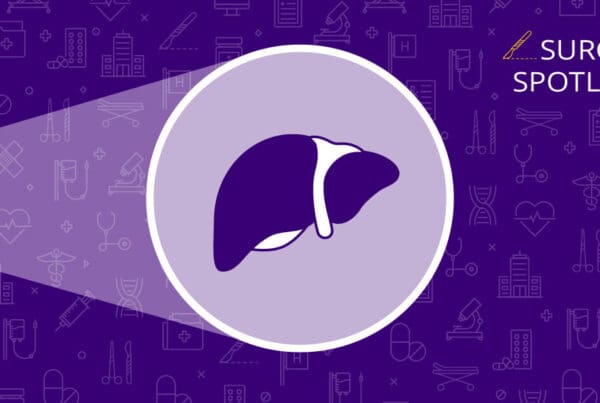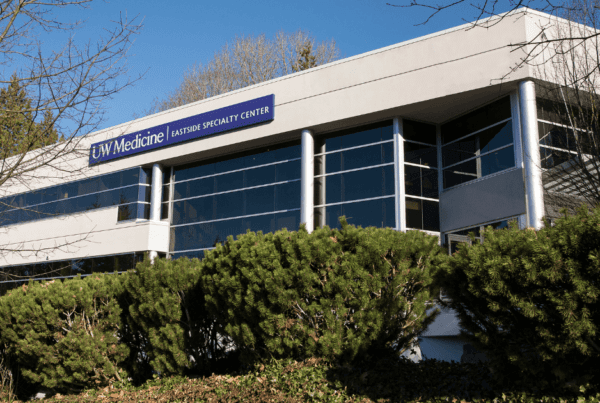Highlights | Demystifying an uncommon cancer
- July is Sarcoma Awareness Month.
- The multidisciplinary team that treats sarcoma patients at UW Medicine and Fred Hutch are experts in the field.
- Though sarcoma is an uncommon cancer, it still deserves attention and sufficient resources to progress treatments for patients.
For Jeremy Sharib, MD, and Lee Cranmer, MD, PhD, the uncommon is their everyday.
That’s because they treat patients diagnosed with sarcoma — a less common type of cancer that makes up only 1% of all new cancer cases.
To learn more about sarcoma we consulted the experts at Fred Hutchinson Cancer Center, an independent organization that also serves as UW Medicine’s cancer program.
Introducing the experts
Jeremy Sharib, MD, a surgical oncologist and assistant professor in the Department of Surgery at UW School of Medicine, has been at Fred Hutch for ten months and recognizes what a unique place it is to work — especially when it comes to the patient population, which is diverse and often travels to get treatment from many surrounding states.
Sharib has always wanted to study and treat cancer — mostly because of how complicated a disease process it is, and because of the huge impact that diagnosis has on someone’s life. He says, “I’m captivated by treating sarcoma both because it’s technically challenging and requires really intricate surgical skills and also because every patient might be a little different with how they present their disease, and how they should be treated.”
Lee Cranmer MD, PhD, director of Sarcoma Medical Oncology at Fred Hutch and Associate Professor of Medicine at UW School of Medicine agrees that the program is special, saying, “When I came here, I knew we had a reputation as a strong center for cancer care. I didn’t realize at the time how strong. It has surpassed my expectations.”
Cranmer actually started his career working in melanoma, but when the previous sarcoma expert left, he was asked to see some sarcoma patients — and his case load quickly picked up from there.
Though he loved working with melanoma patients, he says, “One of the things that drew me to focus specifically on sarcomas was that the sarcoma patients needed me more. There have been such advances in melanoma, but sarcoma patients desperately need advances. So, I decided to focus my efforts on sarcoma.”
What is sarcoma?
According to Fred Hutch, sarcomas are cancers that develop in connective tissues, including bones, cartilage, muscles, veins, arteries, skin and fatty tissue. In the U.S., around 13,000 people are diagnosed with soft tissue sarcoma and 3,500 are diagnosed with bone cancer every year.
“Sarcomas can arise anywhere in the body,” says Sharib, “which is unique compared to breast cancer or prostate cancer. And people will present in different ways — they might have a palpable mass, a new pain or even a fracture. Usually, there are non-specific symptoms.”
How is it different from carcinoma — the more recognizable kind of cancer? Carcinoma typically arises from the cells that line the various tubes in our body (like the colon or the tubes in the lungs), whereas sarcoma is from the cells that are between organs or deep within the walls.
Cranmer points out, every time you eat something, the cells in your colon are going to be exposed to it, and every time you take a breath the cells in your lungs are going to be exposed to whatever there is outside — which in part might explain why carcinoma cancers are more common.
And when patients diagnosed with sarcoma cancer ask him what they did to cause this? “Generally nothing,” says Cranmer. “There’s nothing you did to cause this, and really nothing you could have done to avoid it.”
There are some genetic syndromes predisposing to sarcomas, and there are factors that are associated with some types of sarcomas, like radiation for cancer treatment or certain chemicals, such as herbicides used during the Vietnam War, but those are things that managed to break through or penetrate the barriers and expose the cells.
Why is it important to bring attention to sarcoma?
Sarcoma is a less common cancer, which means that many people aren’t as aware of it as say, breast, colorectal, prostate or lung cancers. But just because it’s a “rare” cancer, Cranmer wants to emphasize that it deserves as much attention as other cancers.
“The problem with calling sarcoma “rare” is that, psychologically, that gives us permission to say, well, maybe this isn’t very important,” says Cranmer.
But it is very important — especially for those affected and for their families and loved ones. He also notes that many of the recent, major advances in cancer care have come from the study of these uncommon conditions.
“A lot of people don’t really understand what sarcoma is,” says Sharib. “It’s often treated as if it’s one disease, and it’s really a group of about 200 different diseases. There are small groups within it that can be treated similarly, but there should be a lot more variability and a lot more understanding than we currently have.”
And though the one-size-fits-all approach is often used because of the uncommonness of this cancer, they ultimately know that providing personalized care is where the truly remarkable advances are happening for patients — which is why Sharib and Cranmer use this approach with their patients.
What sets us apart from other treatment centers?
It is the comprehensive and tight-knit team that sets this program apart when it comes to caring for patients with sarcomas.
The only place in the Pacific Northwest with highly specialized sarcoma care, the Fred Hutch team includes surgical oncologists, orthopedic oncologists, medical oncologists, and radiation oncologists. Even the radiology and pathology team members have sarcoma-specific expertise. The treatment team is also backed up by physicians and surgeons with complementary expertise, sarcoma-focused mid-level providers and pharmacists, sarcoma nurses, nutritionists, clinical- and laboratory-based research staff, social workers, palliative care specialists, integrative medicine specialists, pain management specialists and more.
“Our ability to think about patients in a comprehensive way is something that is really unique to us,” says Sharib.
Clinical trials are also essential to the team, since there are less resources devoted to studying sarcoma. This means that patients who enroll in trials are also helping advance the treatments for future sarcoma patients. “I am so impressed by the willingness of our patients and their family members to partner with us, at this stressful time in their own lives, to join together in the work to solve the sarcoma problem,” Cranmer notes.
What does the future look like for sarcoma care?
Right before the pandemic hit, the program was gifted a generous donation from UW alumni Curtis and Elizabeth Anderson, who lost one of their children to sarcoma.
“They made a substantial donation to support our infrastructure, including development of a sarcoma-specific fellowship program and support for database and sample curation. These are some of the critical underpinnings of a research program, but ones that don’t attract the needed support,” says Cranmer.
Both of them see a bright future for the program as it continues to grow, thrive and help bring more attention to sarcoma.


